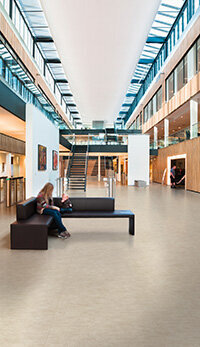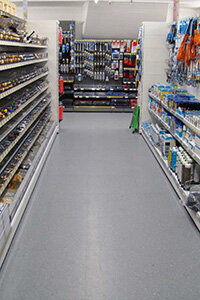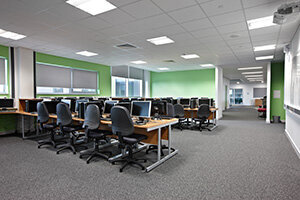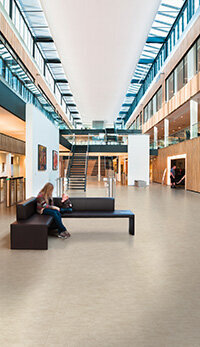An introduction to commercial flooring
Our previous articles have looked at flooring purely in a domestic context, considering what types of flooring are best for each room of the home, and looking at the key flooring products that are used in people’s houses. Commercial flooring is very different from domestic flooring, however. For example, wood flooring, LVT flooring and laminate flooring are all very popular in the domestic market, but not as popular particularly when it comes to the commercial side. Commercial flooring is also not something that many people know much about, so this guide is designed to provide an introduction to the world of commercial flooring.
Vinyl flooring
When some people think of vinyl flooring, the image that immediately springs to mind is of the lino on the floor of their grandmother’s kitchen, but vinyl flooring has come a long way since those days. Whilst it is still very popular in the domestic sector, vinyl flooring is also particularly popular in the commercial sector. So what is the great appeal when it comes to vinyl flooring?
Well, firstly vinyl flooring is very easy to maintain, which makes it extremely popular in a number of industries. It doesn’t matter if it gets wet, or covered in muddy footprints, or if anything is spilt on it. You can very quickly and easily wipe it clean using a mop.
It is particularly popular in hospital corridors and wards. Hospital wards tend to have a lot of people walking through them, with nurses and doctors rushing around to tend to their patients, visitors entering and leaving to spend time with their friends and relatives, and of course patients themselves moving around the ward.
Visitors might enter the ward with either wet or muddy feet, which could bring about a risk to patients, staff or visitors who might slip or fall over. Hospitals also see a lot of spillages on floors – medicines, water, food to name but a few, which need to be cleaned up as easily and as quickly as possible. Dirty floors in hospitals also increase the risk of germs and potential infections for people who are already vulnerable. It is therefore vital to have a floor that is easy to keep clean for both safety and hygiene reasons, and vinyl flooring provides just that.
Unlike tile floors, there is no grouting involved in vinyl flooring, meaning there aren’t any little gaps that bacteria can get easily into and avoid being scrubbed out. This means that vinyl flooring is easier to keep clean that ceramic flooring, and therefore more hygienic.
Vinyl flooring is also very hard wearing. Many vinyl floors come with a commercial rating, which makes them ideal for most commercial environments, allowing the floor to withstand heavy foot traffic. This means that you can use vinyl flooring in shops, hospitals, doctors’ surgeries and other type of commercial environments without fear of it being easily damaged by the large amount of foot traffic.
Finally, modern good quality vinyl floors look really good, and can look very impressive to visitors, customers, clients, patients and others. It also comes in a wide range of styles and colours to suit the image you are trying to create.
Safety flooring
In many industries, safety flooring is essential in order to provide a safe working environment. Safety flooring is very similar to the vinyl flooring mentioned above in that it is very easy to maintain and keep clean as well as being hardwearing and hygienic, but crucially it is also slip resistant. An R10 rating means that a floor is slip resistant, and so with safety flooring you are able to keep your floors clean and hygienic easily without sacrificing the health and safety of your employees, customers or members of the public.
Safety flooring used to have carborundum sprinkled in it which gave it a glittering look, and so when you think of safety flooring you may think of that look, but it has moved on since those days and it is now available in a wide range of designs, colours and styles.
Safety flooring is particularly popular and in fact quite essential in areas where the floor is likely to get wet and needs to be cleaned down frequently, and so is often used in hospitals, universities, commercial kitchens, school kitchens, toilets, schools, nurseries, leisure facilities, retail stores and care homes.
Safety flooring doesn’t just have to go on the floor either – it can also go up the walls, which is ideal for commercial kitchens, factories and other similar rooms where you might need to hose the whole room down to keep it clean and hygienic.
Its main purpose is to prevent slips, trips and falls, as these are the most common cause of major injuries in all workplaces, in the UK. Slippery, wet and uneven surfaces are some of the main causes of slips and falls at work, and so health and safety legislation stipulates that floor surfaces must not be slippery, which could risk people’s safety.
Commercial carpets
Commercial carpets are another particularly popular option for businesses in a wide range of industries; this is because of the cosmetic look and feel that carpet can give a business. Carpet suggests luxury, it suggests warmth, and it suggests quality. For some industries, the look and feel of this type of flooring is incredibly important to them.
Take a school for example. Schools used to just have floorboards for the children to sit, walk and crawl on, but times have changed. For prospective parents looking around a school trying to choose where to send their children, seeing nice carpets on the floor is going to impress them. They want to know that if their children are crawling around on the floor, or if they are sitting on the floor, or if they fall over, there is going to be something soft and warm and comfortable underneath them rather than something cold, hard and uncomfortable. It is of course important to balance the look and feel of the carpet with more practical factors – a carpet that is going to have dozens of children running on it on a daily basis needs to be made of good quality material that is appropriate for the school’s needs.
Interestingly, the type of flooring that might have been popular in an industry once might no longer be popular now. As with in the home, what type of flooring you might choose for your business can change with the times and with fashions. Pubs are a fantastic example. Go back 10 or 15 years and almost every pub you would have gone into in the country would have had carpet. These were generally narrow width carpets sewn together, each one 27 inches wide, and made out of a wool mix. They were wool carpets because wool doesn’t burn – it chars, and so when people dropped their cigarettes, as they inevitably did, it simply left a tiny little hole. The carpets were then heavily patterned so that you couldn’t see the dirt, food and drink stains and other marks. Now of course, this has become irrelevant since the introduction of the smoking ban, as people aren’t allowed to smoke in pubs, so landlords have much more choice as to what they have on the floor of their business. Many now choose a hard floor instead as it is easier to maintain and is more fashionable, particularly if they are now promoting their restaurant side more than they would have done previously.
Of course, for many industries carpet is completely inappropriate – you wouldn’t have it on a hospital ward, or on a factory floor. It also depends on what look and feel you are going for. If you have a pound shop, for example, you might not want a nice looking carpet on your shop floor as it would not go with the “cheap and cheerful” style that you were going for. At the same time, if you own an upmarket restaurant or home decor shop, you might not want vinyl sheets.
It is also worth remembering that you don’t just have to have one type of flooring throughout your commercial premises. Take a doctor’s surgery for example. There, you might have comfortable, nice looking carpets in the reception and waiting area, but vinyl in the areas where medical examinations are being carried out.
Carpet tiling
Carpet tiles are very popular in the commercial world. There is no particular reason why a business would wish to use carpet tiles over commercial carpets – it simply provides a different look. Carpet tiles are particularly popular in offices and libraries. A huge practical benefit of using carpet tiles rather than carpet is that it cuts down on the amount of waste. If you are laying carpets in rooms, you have to cut it from a large role of carpet to fit the space you have, but with carpet tiles you can just lay the individual tiles to fill the space, and if you have to do any cutting to fit the space, you only have to cut individual tiles rather than a whole carpet. This applies particularly in large buildings with lots of rooms and lots of floors, and lots of objects that you have to cut round.
If you use castor chairs in your offices and you’re choosing carpet or carpet tiles, you should make sure that the product you are using will be castor chair proof, otherwise your carpet or carpet tiles will get damaged in no time at all.
Ultimately when choosing flooring for your business you are likely to be governed by two things – the look created by the type of flooring you choose, and the needs of your business. The four types of flooring outlined above are the most popular forms of flooring commercially, but to learn more about commercial flooring, get in touch with us.
Case Studies
Torsion
This was Student accommodation for Lincoln University fitting Rimini carpet tiles throughout the living accommodation with Gradus PVC nosings to the staircases. Safety flooring in shower areas and Luxury Vinyl Tiles to kitchens
Dixon Ward at Lincoln County Hospital
Another installation carried out by our experienced Contracts fitting team fitting Altro white rock to walls to form a totally hygienic surface.
Alive Church
Wall cladding in one of their family rooms with with gerfloor tara safe ultra non slip area for wet play with Lincolnshire flooring Ruston Tiles in colour lead.
Retail installation with Beautiful stair runner in Telenzo Carpet
Retail installation with Beautiful stair runner in Telenzo Carpet in colour Gravel finished off perfectly with some stair rods in colour Pewter.
Beautiful stripe carpet by Castlemead
Woodpecker engineered wood installation finished off with a complementary modern twist, beautiful stripe carpet by Castlemead in colour Velvet Stripe.

















